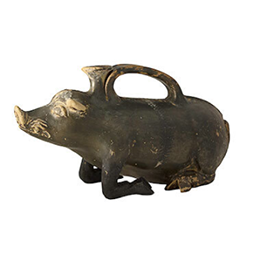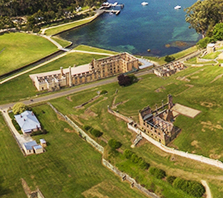Department of Archaeology, Classics and History
 Our students and researchers are part of local and global efforts to uncover the remnants of past societies. We piece together the ancient past, using modern, innovative approaches and perspectives. Whether looking at ancient Rome, the Middle Ages, colonial Australia or modern Europe, our students can delve into the cultures, people and events that have shaped the world and changed life as we know it. We have a particular expertise in Australian hustory, heritage and archaeology.
Our students and researchers are part of local and global efforts to uncover the remnants of past societies. We piece together the ancient past, using modern, innovative approaches and perspectives. Whether looking at ancient Rome, the Middle Ages, colonial Australia or modern Europe, our students can delve into the cultures, people and events that have shaped the world and changed life as we know it. We have a particular expertise in Australian hustory, heritage and archaeology.
Whether studying the ancient or modern past, our researchers and students have access to a wealth of artefacts, libraries and documents and opportunity for field trips, international exchanges and study programs to complement their studies. Our research and teaching are closely connected to the UNE Museum of Antiquities and the regional archives housed in the University of New England Heritage Centre. We are also using innovative 3D visualisations of sites and objects to ensure that students can fully engage in our educational programs, no matter where they are based. Our citizen science programs provide students with additional opportunities to engage with and help UNE researchers, whether collecting data on sites, transcribing archival documents, or assisting in data analysis, and to further develop vocationally relevant skills.
Our courses
Our courses develop our students' skills and techniques enabling them to effectively extract and interpret a range of information about the past.
Archaeology
Classics & Ancient History
History
Local, Family and Applied History
Our research
Our staff and students undertake a wide range of research and field work all around Australia and the world. Our expertise includes colonial Australia, the ancient stone and bone records, and fresh insights into modern historical times and events. Somewhere in the early history of stone tool-making, researchers believe the unique ability of humans to transmit knowledge began to differentiate them from other animal species. A $1 million dollar Australian Research Council funded project will enable a research team led by UNE’s Associate Professor Mark Moore to pinpoint the moment in time where the basic ability to imitate evolved into the ability to create collective knowledge, through examining the stone tool record. Lead researcher: A/Prof Mark Moore The antiquity of the dingo, its cultural importance and ecological impact are among the most vexed issues in rural and regional Australia today. Whether to conserve the dingo as a native species or exterminate it as an invasive pest hinges on its origins and heritage, as well as the role it has traditionally played in the landscape. A research team will collect well-preserved bone samples from caves and conduct morphological and genetic analyses, and genome sequencing on the ancient dingo skeletons. The will be carbon-dated and have collagen extracted for isotopic and genetic analyses. This new genetic analysis will help determine the variability and origins of the dingo species. Lead researcher: Dr Melanie Fillios Using historical and archaeological methodologies, this research project is examining the use of unfree labour in workshop-based settings. In collaboration with the Port Arthur Historic Site Management Authority (PAHSMA), the project is based upon an archaeological excavation of the Port Arthur penal station (1830-77) workshops. This complex housed the station’s convict artisans, working as shoemakers, tailors, blacksmiths, carpenters, wheelwrights. The work ranged from simple production tasks, to complex manufacturing in different mediums. This research aims to understand more about the people, processes and products. The project is part of a wider and ongoing research project into convict labour which has been running since 2017. This ARC-funded collaborative project – Landscapes of Production and Punishment: the Tasman Peninsula 1830-1877 – has involved researchers from UNE, PAHSMA and the University of Liverpool (UK) using archaeological and historical evidence to examine how landscape and space affected the labour experience of convicts incarcerated at a number of stations – Port Arthur included. Researcher: Dr Richard Tuffin, Postdoctoral Research Fellow. Our researchers are engaged in long-term research projects dealing with medieval and early modern European social and religious history, illuminating the foundations of the modern world and exploring topics such as the history of the medieval Hussites, heresy, religious identity anti-Semitism and anti-Semitic propaganda in early modern Europe and the history of the Spanish and Portuguese Inquisitions. Lead researchers: Professor Thomas A. Fudge and Dr Francois Soyer Dr Piers Kelly has an Australian Research Council DECRA-funded project commencing in 2022, titled ‘Message sticks: Long-distance communication in Indigenous Australia’. Message sticks are marked wooden objects that were once used throughout Indigenous Australia to convey important information between communities. The intended outcome of this project is to answer a central question: What role did message sticks play in Indigenous long-distance communication? Drawing on archival evidence and original fieldwork in the Top End, the project aims to be the first empirically grounded study of message sticks as a practice. The project expects to define message sticks as a class of material culture, explain their communicative dynamics, generate new cross-cultural insights, and strengthen collaborations between research institutions, museums and Indigenous cultural organisations. Updates on the project can be followed at Piers' blog, Brave New Worlds, or via Twitter: @perezkelly. Lead Researcher: Dr Piers Kelly.
Projects and activity
Our projects draw on our expertise in digital technology and the wealth of unique information we have at our fingertips across the department. Project leader: Dr Bronwyn Hopwood JACH has a broad and expanding readership and is currently held in numerous Australian and overseas libraries. Most contributors are from Australian institutions, though works have been published by overseas scholars from the University of Edinburgh, King's College London and California State University, and by independent scholars from Britain and South Africa. This project is spatially locating places, spaces and events related to Australia's convict past. The project's first output was a GIS-based mapping experience of the Port Arthur penal station, produced in collaboration with Port Arthur Historic Site. A map of convict Van Diemen's Land has just been created, with work underway on mapping the rest of Australia. Lead researchers: Dr Richard Tuffin and Professor Martin Gibbs The UNE Museum of Antiquities is moving its 3,000 ancient artefacts onto an open access online platform (Pedestal 3D).
The UNE Museum of Antiquities is moving its 3,000 ancient artefacts onto an open access online platform (Pedestal 3D).
This project will improve accessibility of the unique collections, to benefit learning and research at UNE and beyond. The technology allows for very detailed colour and texture scans, and objects can be viewed closely, enhanced, measured accurately and manipulated for viewing at all angels, for an improved user experience. We produce and publish the Journal of Australian Colonial History (JACH). The journal produces one volume annually, each consisting between 7–10 scholarly articles, plus book reviews and research notes, on a wide variety of subjects including convict history, bushranging, Aboriginal-settler relations, nineteenth century legal and medical developments, colonial nationalism and republicanism, colonial literature, imperial history, biography, and various aspects of Australia's early social, economic and political history.
We produce and publish the Journal of Australian Colonial History (JACH). The journal produces one volume annually, each consisting between 7–10 scholarly articles, plus book reviews and research notes, on a wide variety of subjects including convict history, bushranging, Aboriginal-settler relations, nineteenth century legal and medical developments, colonial nationalism and republicanism, colonial literature, imperial history, biography, and various aspects of Australia's early social, economic and political history. Convict Landscapes: Locating Australia’s Convicts, 1788-1868
Convict Landscapes: Locating Australia’s Convicts, 1788-1868
View the project website.
Contact us
To find out more about our department, please contact:
Head of Department, Archaeology, Classics and Ancient History
Professor Richard Scully

